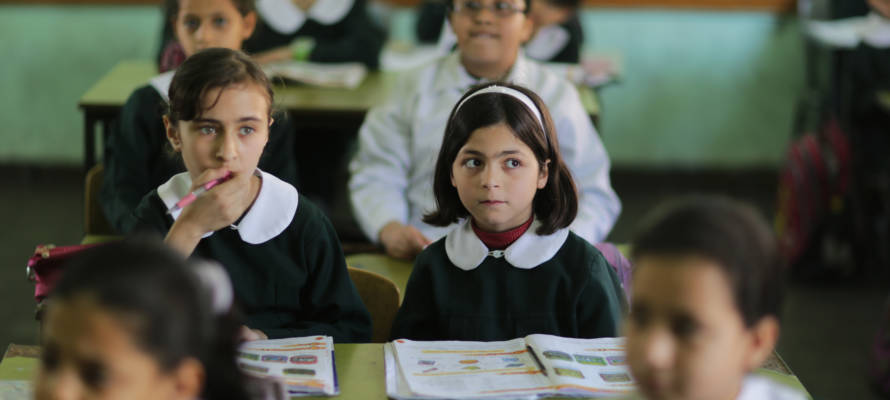Education subcommittee chair says 20,000 students in eastern Jerusalem follow the Palestinian Authority curriculum which teaches incitement against Israel.
By United with Israel Staff
20,000 Arab students in Jerusalem are being educated to hate Israel in accordance with the Palestinian Authority curriculum, Education Subcommittee Chair MK Amit Halevi says.
The Education, Culture, and Sports Committee’s Subcommittee on Curricula in Eastern Jerusalem and Their Supervision convened on Sunday for its first meeting, and heard a briefing on the curricula studied in eastern Jerusalem.
The subcommittee members were told that 20,000 students follow the Palestinian Authority curriculum, and 55,000 learn according to the Israeli curriculum.
“20,000 students in eastern Jerusalem learn according to the Palestinian Authority curriculum, and it’s not a curriculum from Switzerland,” MK Halevi said.
“It’s unacceptable that 20,000 students are being educated to incitement within the State of Israel and are not subject to any supervision. That needs to change.”
According to Lara Mubariki, head of the Jerusalem Municipality’s Arab Education Department, “120,000 students study in eastern Jerusalem, of whom 20,000 attend private institutions such as UNRWA institutions, and they have no connection to the Israeli establishment. I can’t even say where they’re located. There are 55,000 students who attend the official institutions, with the Israeli curriculum, under state supervision. Sixty percent of them go on to study at Hebrew University and at the Hadassah and Azrieli colleges.”
“Today there are more and more students who want to register for schools with the Israeli curriculum, but there’s a physical lack of buildings. The people on the ground are eager and willing,” she added.
The subcommittee heard from “A.,” who spoke wearing a face mask for fear of his life.
“I attended a school in eastern Jerusalem, which follows the Palestinian curriculum. When I started studying, I didn’t learn about the State of Israel. We learned about the Palestinians and that there is occupation,” A. said.
“We didn’t learn Hebrew, because we were told that the occupation was temporary and it wasn’t necessary. We were taught that we should hate Israel. From 1st grade we learned to hate Jews. From age 10 we learned that whoever goes to murder Jews will receive 72 virgins. Some of the teachers who taught me were terrorists who were in prison in the past, and some of the students who studied with me are in prison today.”
Halevi commented on the fact that A.’s face was covered, saying: “It’s a disgrace that a former student has to come here covered up and concealed. It’s a great shame for us. We as a state take into account that he can’t be protected.”
Natan Shor, the Jerusalem Municipality official in charge of censorship of textbooks, explained that the municipality funds the editing and printing of textbooks studied in eastern Jerusalem, but is “instructed to perform censorship on the textbooks [of material inciting against Israel] only until 10th grade.”
“In 11th and 12th grades, we don’t give textbooks in eastern Jerusalem, but rather the Palestinian Authority [does],” he said. “These are the same books that are studied in Gaza, Nablus and Ramallah.”
“The reason is that the books conform to the questions of the Palestinian matriculation exam, in which there are incitement materials,” he explained.
Halevi called this an “open wound,” saying that “we give free rein in 11th grade. Perhaps we should consider a 20% grade adjustment factor for those who are harmed. For the next debate, I am requesting to receive the text of the Palestinian matriculation exam.”
Liron Sfard of the Ministry of Education’s Legal Department explained that the institutions in question were unsupervised due to “historical circumstances.”
“This is a political issue, it’s known and it isn’t [decided by] the Ministry of Education. This is a directive of all the governments of Israel, not of one specific minister or another.”
“In this committee, we have to produce additional tools for the Ministry of Education to deal with schools that encourage incitement,” Halevi concluded. “The sanctions that the Ministry of Education has [at its disposal] need to change and become more significant—not just in terms of closing or not closing a school.”
